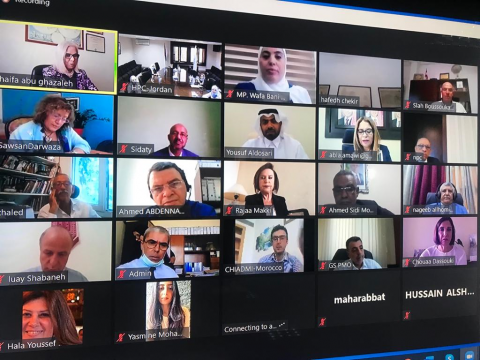

On the occasion of the World population Day, HPC participated in a virtual meeting on Wednesday organized by the General Secretariat of the Arab League (Social Affairs Sector/ Population Policies Department/ Technical Secretariat of) in partnership with UNFPA. The meeting was attended by ACPD members, including heads of national population councils and committees in the Arab countries, as well as social, economic and cultural experts to look into the impact of Covid-19 on the population.
HPC Secretary General, who is also the chairperson of the Arab Council on Population and Development, Dr. Abla Amawi, participated in the meeting on behalf of HPC, and was joined by the Assistant Secretary General and Head of the Social Affairs Sector in the Arab League, Ambassador Dr. Haifa Abu Ghazaleh, and the UNFPA Regional Director for Arab States, Dr. Luay Shabaneh. The meeting aimed to review the direct impact of Covid-19 on different population groups from a scientific perspective, and exchange expert opinions on the implications of the pandemic on the population in different fields.
Dr. Abla Amawi stressed the importance of holding such meetings during the Covid-19 pandemic which has impacted countries around the world, and particularly the Arab region and has taken its toll on social, economic and political sectors. Dr. Amawi explained that collaboration at all levels is essential to limit the consequences of the pandemic on the lives of people in different countries.
Amawi noted that countries of the world, including Arab countries, are experiencing a serious health crisis as a result of the pandemic, as healthcare systems are faced by the daunting challenge of securing access to medical equipment and supplies. She added that these challenges are particularly exacerbated in the Arab region due to the raging conflicts that have seen the numbers of refugees and displaced persons increase and their situation worsens due to the pandemic.
Furthermore, Amawi indicated that it may be difficult to achieve the target of zero harmful practices, as the progress that had been made across the world is now at risk of being reversed due to the pandemic, which has made work even harder and more urgent, left more girls at risk, and increased the cost of ending common harmful practices such as child marriage.
Amawi explained that the economic situation of women in the Arab region is fragile due to social factors that prevent women from participating equally as men in the labor market, highlighting that women’s participation in the labor market in the Arab region stands at 21% compared to 70% for men, whereas the unemployment rate of women is approximately 19% compared to 8% for men. According to a report issued by the Arab League on the social, developmental and health implications of Covid-19 “The current Situation and Future Outlook”, 25 million jobs are expected to be lost around the world owing to the spread of Covid-19, including 1.7 million jobs in the Arab region of which 700 thousand jobs are held by women. Unemployment rate in the Arab region is expected to reach 1.2 percent points, while the middle class is expected to shrink, pushing more than 8 million additional people into poverty, especially those working in the informal sector.
The Arab League report highlights the impact of Covid-19 on the education sector and explains that nearly 1.344.914 billion children and youth have stopped going to schools and universities in 138 countries around the world (82.2% of students). The report indicates that for 70% of learners around world, schools represent the primary method of education, thus the lockdown has denied them the opportunities for growth and development.
Dr. Amawi noted that closing the global gender gap will require around 100 years, while closing the gender gap in terms of participation in the economy will take up to 257 years as per the 2020 State of World Population Report.
“Population committees and councils could play a key role in this respect by building partnerships with government agencies, national statistics departments and research centers to provide decision-makers with evidence-based policy proposals that focus on integrating the demographic dimension and characteristics of different population groups in development plans, including crisis response plans, to achieve comprehensive social protection for all segments of society,” Amawi added.
The meeting looked into current population issues and priorities and discussed the (economic, political, social, psychological, cultural and health) implications of Covid-19 on the population and their future in the Arab region and ways of capitalizing on the youth’s potential to support governments in addressing the pandemic. The meeting also sought to stress the importance of integrating population dynamics in any crisis-response plans, particularly issues related to gender-based violence, vulnerable groups, and persons with disabilities, refugees, female-headed households, and workers in the informal sector.
At the meeting, the participating experts shared their input, including a contribution by the World Health Organization Special Envoy on Covid-19, Dr. Maha Rabbat, entitled “The Impact of Covid-19 on the world and the Arab region-Challenges and Opportunities”, and a contribution on “the Impact of Covid-19 on Families in Tunis” by demographics expert and former regional director of UNFPA in the Arab States, Dr. Hafeth Shukair.
In addition, Jordanian MP and head of the Coalition of Women MPs from Arab Countries, H.E. Wafa Bani Mustafa, talked about “Covid-19 Impact on Violence Against Women”, while designated minister and former director of the Population and Migration Policies Department in the Arab League and expert in population and youth policies, Khaled Allouheshi, talked about “Harnessing Covid-19 to support youth policies and action nationally and regionally”.
Other contributions by experts at the meeting included the “Psychological impact of Covid-19 on the population in the Arab region” presented by pathology and social psychology professor at the Lebanese University, Dr. Raja Makki, and “the Impact of Covid-19 on media and the Cultural Landscape” presented by Ms. Sawsan Darwazeh, producer and director of the Karama Human Rights Film Festival in Jordan, the partner association of Ma3mal 612Think for youth entrepreneurships.







